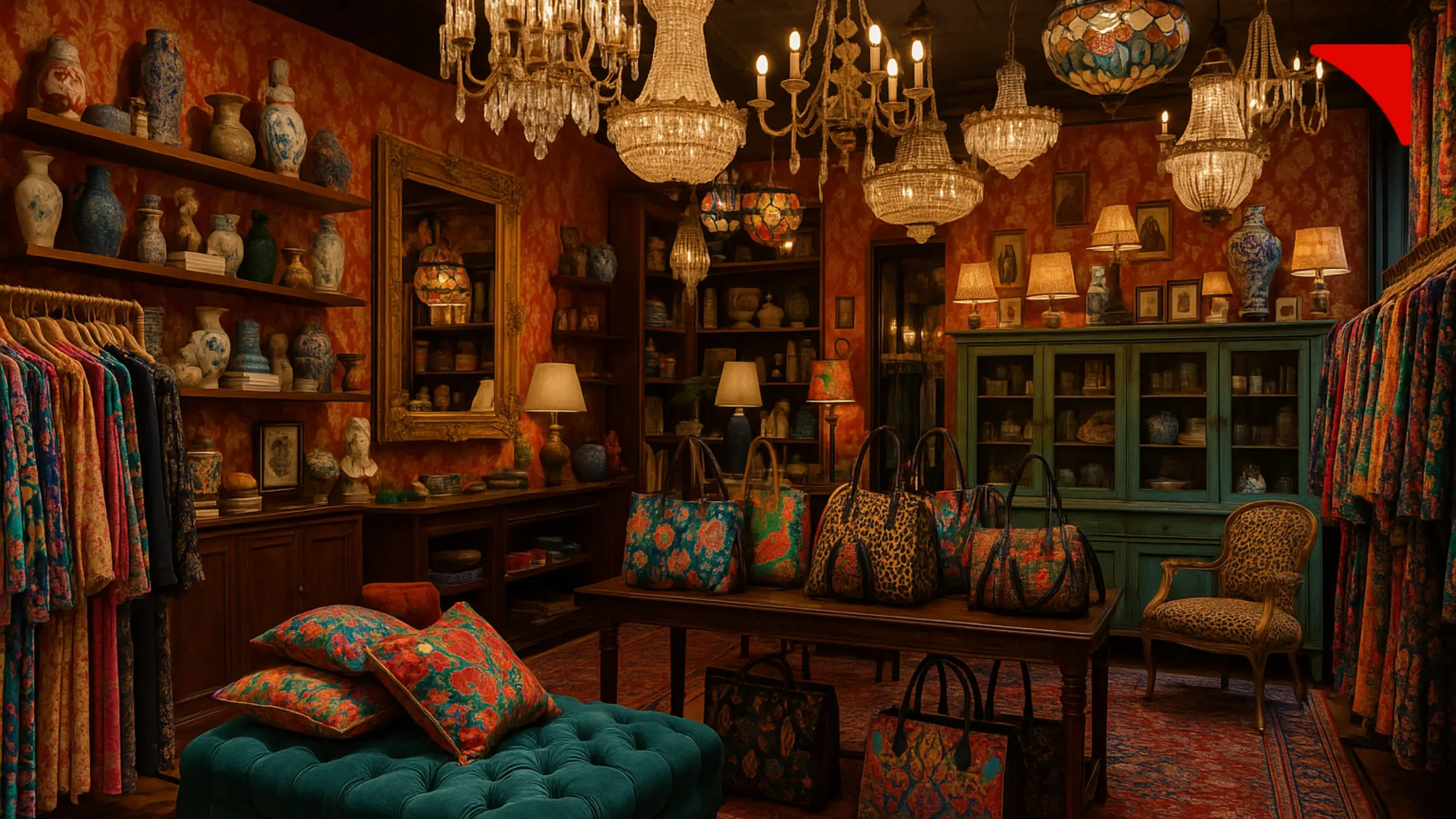WHY IS MAXIMALISM MAKING ITS WAY INSIDE SHOP INTERIOR DESIGN?

After witnessing various ecological & economic crises wreaking havoc, we are not leaving any chance to chase joy & laughter, even in the slightest moments. While the last few years felt like an eternal doom, the light at the end of the tunnel had people seek far bigger expectations from the entities that have the power to change the world; retail being the most prominent and most influential industry, stayed at the front shouldering the responsibility to align with the consumer's expectation.
As the bruised feeling persists in people, so shines and emerges concepts that could positively impact the emotional state, and this has a lot to do with people's experience in-store. The driving force behind consumer attitudes is Joy-a dominant emotion. Hence, the Maximalism Movement has swiftly made its way inside physical retail, where designers use outside chaos to blend in vibrant tones that ooze the feeling of joy.
Every artist is obsessed with the idea of Minimalism in design. From dominion in digital websites to physical retail stores, it is an ennobling concept to infuse in every art they create. And who can we blame? This Japanese idea of simplicity feels calmer. But when there is too much order, the mind craves rebellion and expression.
Since Zalpha dominates the generation- GenZ & Alpha combined, their zeal and curiosity for everything unique yet purposeful has led brands to be creative with the product and the shop interior design, formulating a new experience and adventure.
What is Maximalism?
 | The emergence of Maximalism theory, as opposed to minimalism, dates back to not one era or style but elements infused from several aesthetics. But the safest bet would be reminiscing the old Hollywood style from the 1930s, where Greek Egyptian culture, Rococo, and Neoclassicism movement cast a shadow on a more Glam & Glitz style, encompassing gold accents, statement lighting, and more. Mixing art and objects of different patterns and geometric shapes procured from different eras, Maximalism collectively is a masterpiece that achieved its purpose with the design philosophy of 'More-is-More, resurging the interest of pouring on rather than filtering it. |
Retail is now addressing the diverse taste of urbane and young consumers with the element of rebellion in design as they introduce maximalism into boutique interior design with bright hues, quirky decor, and vibrant textures.
When it comes to design, minimalism exalts the attention of designers because it has always been synonymous with better user experience. However, younger consumers' preference demands compelling communication, which has more to do with identity and individualism. Hence, brands put chaotic maximalism at the front seat to drive an engaging experience inside brick & mortar stores, meeting consumers at a point where they can find resonance with the brand.
Factors Influencing the Rise of Maximalism in retail outlets
| We emphasized the consumer's intent to challenge conventional identities and move beyond the usual to emulate more prosperous parts of their creative expression. Hence, maximalism design leans deeper onto bolder decisions and strikes excitement attending to specific reasons, each of which addresses the dystopian times, shifting from the sameness of digital and physical retail reality: |  |
The Aspect of Sustainability & Second-Hand Fashion
 | Maximalism answers GenZ's sustainable trends and concerns, which is probably why they favor minimalist styles regarding clothing options. By embracing second-hand fashion trends, which include vintage pieces but also minimizing waste production, GenZ is making its voices heard and creating a positive impact. This is becoming increasingly prevalent in retail, where brands implement second-hand elements to design the store and utilize bold patterns that amplify the consumer's experience. |
The Need for Self-Expression
WGSN states, "Certain colors evoke a subconscious physical response connected to a primal instinct". Colors are at the center of maximalism, but more elements go beyond the boldness of colors in the maximalism interior. It's about entering a distinct reality and viewing your imagination from a whole new perspective. The rise of this trend is primarily due to the rebelliousness in genZ when it comes to the trends set by the millennial generation. They want elements that enable them to express their choices, allow them to experiment with their thoughts, and feel more individualistic. Brands are now making it possible for these younger audiences to have an escapade so different when they enter the store threshold and form a connection so deep. |  |
Refined Brand Building Strategy
 | Tiffany & Co. is an excellent example of utilizing vibrant maximalism in the brand-building strategy where its trademark robin' blue egg took a turn and reformed into a bold yellow hue, attracting engagement while putting consumers into massive shock. Maximalism has the potential to do multisensory marketing, accentuating brand awareness amongst consumers who are so attracted by the vibrant hues, bold textures, and patterns. Maximalism is here to stay for the younger generation looking for more creative expressionism. Since brands are trying to make way for this age group to reach their door, the interior design would reflect this theory and oppose minimalism. |